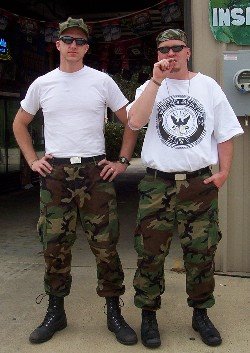For those of you who are feeling a more Warrior bent to your lives these days ... indulge me a bit? For those who just aren't -feeling it- ... my apologies. This is just one of those posts I feel that I need to make.
As I've mentioned before ... I've studied a good deal about Warriors and Warfare in the past few years. I've studied Asian models of Warriors as well as Greek and Roman models of Warriors. I've looked closely at words such as Hero, honor, obligation, integrity, committment and such. I've looked at how those words apply to the life of a Warrior. My personal favorite IN SPITE of the strong Asian leanings is the life of the Samurai. Not all Men or Warriors of the ancient cultures are selfless ... some more determined by selfish forces than altruistic ones and certainly the Samurai are no exception. However ... I'd like to look at a few parallels if you can set aside the obvious religious or philosophical differences in motivation to see the common ground.
Bushido, literally translated "Way of the Warrior," developed in Japan between the Heian and Tokugawa Ages (9th-12th century). It was a code and way of life for Samurai, a class of warriors similar to the medieval knights of Europe. It was influenced by Zen and Confucianism, two different schools of thought of those periods. Bushido is not unlike the chivalry and codes of the European knights. "It puts emphasis on loyalty, self sacrifice, justice, sense of shame, refined manners, purity, modesty, frugality, martial spirit, honor and affection" (Nippon Steel Human Resources Development Co., Ltd. 329).
From Buddhism, Bushido gets its relationship to danger and death. The samurai do not fear death because they believe as Buddhism teaches, after death one will be reincarnated and may live another life here on earth. The samurai are warriors from the time they become samurai until their death; they have no fear of danger. Through Zen, a school of Buddhism one can reach the ultimate "Absolute." Zen meditation teaches one to focus and reach a level of thought words cannot describe. Zen teaches one to "know thyself" and do not to limit yourself. Samurai used this as a tool to drive out fear, unsteadiness and ultimately mistakes. These things could get him killed.
http://mcel.pacificu.edu/as/students/bushido/bindex.html
For the Christian, we too have motivation that enables us to not fear death and to drive out fear, unsteadiness, and cowardly acts. We have the absolute of all absolutes ... we have an understanding of who our God is ... and of the price ALREADY paid for us by our Lord and Christ, Jesus. We have the same foundational motivations as the samurai though we derive that foundation in completely different ways religiously and philosophically.
Shintoism, another Japanese doctrine, gives Bushido its loyalty and patriotism. Shintoism includes ancestor-worship which makes the Imperial family the fountain-head of the whole nation. It awards the emperor a god-like reverence. He is the embodiment of Heaven on earth. With such loyalty, the samurai pledge themselves to the emperor and their daimyo or feudal landlords, higher ranking samurai. Shintoism also provides the backbone for patriotism to their country, Japan. They believe the land is not merely there for their needs, "it is the sacred abode to the gods, the spirits of their forefathers . . ." (Nitobe, 14). The land is cared for, protected and nurtured through an intense patriotism.
http://mcel.pacificu.edu/as/students/bushido/bindex.html
While more asian philosophies and religious beliefs give the samurai a basis of loyalty and patriotism, we again have the ultimate source of motivation for loyalty. A loving God who has sought us, redeemed us, loves us and will spend eternity with us. A God who deals in grace and mercy is the highest motivational source of loyalty and we believe that our land isn't merely here to be robbed but that it is a part of God's creation and founded on Christian principles.
Confucianism gives Bushido its beliefs in relationships with the human world, their environment and family. Confucianism's stress on the five moral relations between master and servant, father and son, husband and wife, older and younger brother, and friend and friend, are what the samurai follow. However, the samurai disagreed strongly with many of the writings of Confucius. They believed that man should not sit and read books all day, nor shall he write poems all day, for an intellectual specialist was considered to be a machine. Instead, Bushido believes man and the universe were made to be alike in both the spirit and ethics.
http://mcel.pacificu.edu/as/students/bushido/bindex.html
Christians also have strong mandates for the moral relationships in our lives ... including honoring our parents, obeying our parents, loving our spouses, and our relationships with our children and our friends. These are not foreign concepts within the Bible nor within the life of a believer who is dedicated to the word of God.
Along with these virtues, Bushido also holds justice, benevolence, love, sincerity, honesty, and self-control in utmost respect. Justice is one of the main factors in the code of the samurai. Crooked ways and unjust actions are thought to be lowly and inhumane. Love and benevolence were supreme virtues and princely acts. Samurai followed a specific etiquette in every day life as well as in war. Sincerity and honesty were as valued as their lives. Bushi no ichi-gon, or "the word of a samurai," transcends a pact of complete faithfulness and trust. With such pacts there was no need for a written pledge; it was thought beneath one's dignity. The samurai also needed self-control and stoicism to be fully honored. He showed no sign of pain or joy. He endured all within--no groans, no crying. He held a calmness of behavior and composure of the mind neither of which should be bothered by passion of any kind. He was a true and complete warrior.
http://mcel.pacificu.edu/as/students/bushido/bindex.html
While I don't think this especially exemplifies the complete life of the Christian man with regards to emotions and with no mention of Faith or relationship to God ... I do think it's important and profound in defining what a Warrior should be. In times of battle a Warrior must suspend some of his emotions and he must endure what must be endured.
Interestingly, samurai were also known for their poetry and their love of the arts. I am not sure how a completely stoic man can embrace the arts with any love or passion but they were expected to. ~laughs~ There are many other facets of the samurai life that I do not subscribe to and were in deed hard to interpret even for the Samurai. The practice or relationship of shudo or bidō is of course, unacceptable to me. (Endorsed homosexuality among Warriors ... similar to the Greeks). And seppuku - ritual suicide to restore or protect one's honor as a warrior is certainly not necessary to the Christian who by grace may restore right standing with God through the blood of Jesus. Seppuku is also difficult in concept because it sometimes wars with other tennets of Bushido in terms of obligation or honoring parents. Is it more shameful to commit seppuku because of a botched decision in battle ... thereby leaving one's family without a protector and provider or is it better to live with one's shame and still provide for one's obligations?
My point in examinging this is not to give a history lesson on Japanese culture in the Samurai period but to examine concepts that make up the Warrior that we have little teaching on in our own culture. Our culture aside from military training is pretty vague about what morals or codes should guide a Warrior. We are not a Warrior society. Right? The Bible is a great basis for the codes of the Warrior without a doubt ... it'd be great if someone would write a book organizing some of those guidelines - using scripture to prescribe the Way of the Christian Warrior. I think it's difficult because we don't see NT Christianity as a warfare focused formula for life. And in some ways it's not ... still, it's helpful to look at the Warrior side of things in light of how we might gird ourselves for the fight that we will face in the Spirit.
I think that taking a look at other Warrior cultures can be a type of parable or analogy that is helpful in giving us a different perspective of the -fight- and the importance of the principles that make up the Man or Woman Warrior.
Or maybe it's just late and I'm babbling because I can't seem to communicate what I'm trying to say ... maybe I'll abandon this tommorrow ... or maybe I'll gut it out for another post or two. I dunno.
Saturday, May 26, 2007
Subscribe to:
Post Comments (Atom)










1 comment:
All I can say is WOW!
Post a Comment